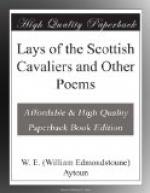THE HEART OF THE BRUCE
Hector Boece, in his very delightful, though somewhat apocryphal Chronicles of Scotland, tells us, that “quhen Schir James Dowglas was chosin as maist worthy of all Scotland to pass with King Robertis hart to the Holy Land, he put it in ane cais of gold, with arromitike and precious unyementis; and tuke with him Schir William Sinclare and Schir Robert Logan, with mony othir nobilmen, to the haly graif; quhare he buryit the said hart, with maist reverence and solempnitie that could be devisit.”
But no contemporary historian bears out the statement of the old canon of Aberdeen. Froissart, Fordun, and Barbour all agree that the devotional pilgrimage of the Good Sir James was not destined to be accomplished, and that the heart of Scotland’s greatest king and hero was brought back to the land of his nativity. Mr. Tytler, in few words, has so graphically recounted the leading events of this expedition, that I do not hesitate to adopt his narrative:—
“As soon as the season of the year permitted, Douglas, having the heart of his beloved master under his charge, set sail from Scotland, accompanied by a splendid retinue, and anchored off Sluys in Flanders, at this time the great seaport of the Netherlands. His object was to find out companions with whom he might travel to Jerusalem; but he declined landing, and for twelve days received all visitors on board his ship with a state almost kingly.
“At Sluys he heard that Alonzo, the King of Leon and Castile, was carrying on war with Osmyn, the Moorish governor of Grenada. The religious mission which he had embraced, and the vows he had taken before leaving Scotland, induced Douglas to consider Alonzo’s cause as a holy warfare; and, before proceeding to Jerusalem, he first determined to visit Spain, and to signalise his prowess against the Saracens. But his first field against the Infidels proved fatal to him who, in the long English war, had seen seventy battles. The circumstances of his death were striking and characteristic. In an action near Theba, on the borders of Andalusia, the Moorish cavalry were defeated; and, after their camp had been taken, Douglas, with his companions, engaged too eagerly in the pursuit, and, being separated from the main body of the Spanish army, a strong division of the Moors rallied and surrounded them. The Scottish knight endeavoured to cut his way through the Infidels, and in all probability would have succeeded, had he not again turned to rescue Sir William Saint Clair of Roslin, whom he saw in jeopardy. In attempting this, he was inextricably involved with the enemy. Taking from his neck the casket which contained the heart of Bruce, he cast it before him, and exclaimed with a loud voice, ’Now pass onward as thou wert wont, and Douglas will follow thee or die!’ The action and the sentiment were heroic, and they were the last words and deed of a heroic




